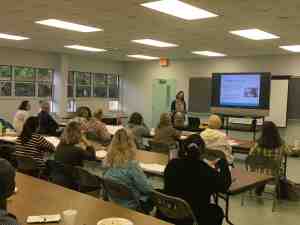A workshop focused on the ins and outs of operating a cottage food industry drew a crowd — and offered practical information to those attending the session.
The daylong event was presented by the Pasco County Extension Office, which is part of the University of Florida Institute of Food and Agricultural Sciences branch in Dade City.
The workshop consisted of sessions regarding the requirements of operating a cottage food business.

It was a popular draw — attracting people who currently own businesses, or are interested in starting them.
Dr. Soo Ahn, an assistant professor at University of Florida, shared her expertise on the topic during the seminar.
“Cottage food is [a] home-based food business,” Ahn explained. “From preparation of raw ingredients to the finer product, each step should be done in your kitchen.”
These products can be organic or processed, but must be prepared only in the seller’s residential kitchen.
While raw foods, such as dried fruit are permissible, those with seed sprouts, open melons, open tomatoes or poultry, are excluded.
Meats and vegetables that are cooked do not classify as cottage foods because they must be preserved at a certain temperature and time frame.
They are seen as potentially hazardous foods because they’re more prone to pathogenic microorganisms and toxins.
Simple items, such as beverages, are also prohibited from selling. Pumpkin pie can’t be sold either, because of the vegetable it contains.
Foods that don’t need refrigeration or freezing, are suitable to sell as cottage foods, Ahn said.
Such items may include loaf breads, pastries, jams, trail mix or popcorn.
She encouraged attendees to do background research because the guidelines can be confusing for sellers.
Ahn also noted that home kitchens may lack items, such as instruments to test acidity levels.
Home kitchens may be unable to accommodate certain equipment used in commercial settings like a restaurant kitchen.
She added that “even though you have [a] machine, you might not know how to use it correctly.”
As an alternate safety measure, cottage foods are required to be packaged with labels consisting of the business or seller’s name, contact information, ingredients, the net weight and potential allergens.
“It is a way so consumers know that this is cottage food, but also it’s a way to protect yourself,” Ahn said.
The Florida Department of Agriculture and Consumer Services is the state agency that creates the guidelines.
Other than a business license, no other certification or permit is needed to sell cottage foods under department statutes.
What’s more, food safety training is not required for sellers, nor is kitchen inspections – unless there are consumer complaints.
An amendment was passed in 2017 allowing cottage food transactions in Florida to occur online.
However, products must still be directly handed from seller to consumer, with no third party involvement.
Even with offline transactions, selling cottage foods to commercial distributors, such as a grocery store for consumer purchase, is prohibited.
This also applies at farmer’s markets, but cottage food bakers can directly sell their products if they are market vendors.
The 2017 amendment also increased the allowable annual sales up from $15,000 to $50,000.
The reason for the sales cap, Ahn explained, is to limit the amount of cottage food an individual can sell and thus decrease any chance of consumer sickness.
Regulations vary from state to state, and some states have fewer regulations than others.
Wyoming, North Dakota and Utah operate under the Food Freedom Law.
This allows both sellers to distribute and consumers to purchase whatever they like at their own discretion, the doctor noted.
New Jersey is currently the only state that does not have any cottage food laws set in place.
Ahn encouraged workshop participants to abide by the standards set in the Sunshine State.
She reminded participants: “It’s your responsibility to make your food products safe and of high quality by learning what is the best practices,” she stated.
To learn more on Florida’s cottage food requirements, visit FreshFromFlorida.com.
For information on local cottage food education, contact Shari Bresin at (352) 518-0156 or .
Published May 08, 2019